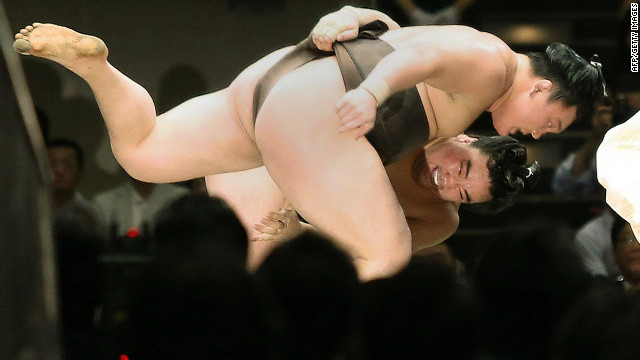A dearth of new recruits is thinning the ranks of sumo wrestlers,
threatening the future of the celebrated but scandal-plagued ancient Japanese
sport.

Mongolian 'ozeki' or champion, Harumafuji (bottom) flings down his compatriot,
'yokozuna' or grand champion, Hakuho in Tokyo on September 23, 2012.
Only 56 hefty young trainees have applied to join sumo stables this year,
about half standard recruitment levels in the early years of the century and
far too few to make up for the 115 wrestlers who left the sport last year,
according to the Japan Sumo Association.
The declining enthusiasm for the tough but potentially glamorous life of
a sumo wrestler comes as Japan's national sport -- which boasts a mythical past
and semi-religious pretensions -- struggles to rebuild a reputation battered by
revelations of bout-fixing, trainee bullying and underworld links.
Fans fret that the shortage of recruits will undermine competition and
make it less likely sumo can attract the kind of talent boasted by great
champions of the past. Shoko Sato, a writer on sumo, said the lack of new
trainees reflected the sport's struggle to maintain popularity among young
Japanese. "Soccer and the Major League [baseball] have greater appeal for
young people now, while sumo has become a sport watched by grannies and
granddads," Ms Sato said. "It's really worrying."
The recruitment problem is just one of a litany of woes suffered by sumo
in recent years. Claims the sport embodies traditional values of discipline,
self-control and moral rectitude have been tarnished by the death during a
hazing of a young trainee in 2007 and episodes of illegal gambling and
dope-smoking among wrestlers.
In 2010, a yokozuna grand champion resigned after reports he was
involved in a drunken brawl and the sumo association was forced to make a
formal declaration that the sport would sever links with Japan's yakuza organised
crime syndicates. The scandals are seen as a big factor in declining audiences,
with rows of empty seats now a familiar feature of NHK's weekday afternoon
television broadcasts of sumo's 15-day tournaments.
The dramatic finale of the autumn competition was watched in 18 per cent
of households, according to Video Research -- far fewer than the 27 per cent
who tuned in for the final day of the tournament in 2009, the last time sumo
made it into the annual TV top 20. Sponsors also appear to be losing interest.
Even fast-food chain McDonald's, previously a loyal provider of prize money for
sumo's ample-girthed athletes, has not backed a bout since March 2011.
Losses at the sumo association have soared, with the sport's governing
body suffering a fall of Y4.9bn in the value of its net assets to Y44bn. Enthusiasts hope that the recent promotion of a new yokozuna champion,
the 133kg Harumafuji, will rekindle public interest by setting up a rivalry
with the veteran wrestler Hakuho, who had ruled alone as yokozuna for the past
15 tournaments. However, the fact that both champions come from Mongolia
highlights worries about foreign dominance of the top ranks of sumo. While Ms Sato said many younger Japanese were actually attracted by the
increasingly cosmopolitan competitions -- which feature grapplers from as far
away as Estonia and Egypt -- many older fans were distressed by the lack of
local champions. "There needs to be a balance," Ms Sato said.
Source: CNN
Please share
No comments:
Post a Comment